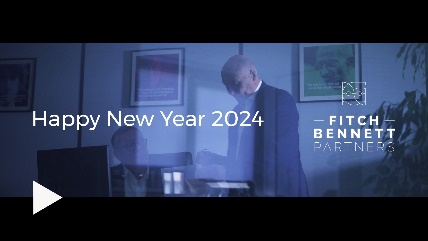At a time when corporate governance is more than ever in the spotlight, Fitch Bennett Partners, in collaboration with Top Management France, took the initiative of bringing together a distinguished panel of 40 executives for a morning of enriching debate and exchange. We are delighted to present the video of this landmark event. Building a solid corporate governance is not a matter of improvisation. It’s a meticulous process that encompasses the development of strategies, the application of rigorous procedures, the guarantee of financial transparency, the establishment of effective communication and the deep integration of corporate culture. These fundamental pillars, although often put to the background in times of prosperity, are crucial to maintaining stability and performance, particularly in a VUCA world (Volatility, Uncertainty, Complexity and Ambiguity.) The question of how to structure efficient governance remains paramount: Is there a universal model, or must each company forge its own path? How can companies align governance and performance to meet tomorrow’s challenges? The morning session brilliantly addressed these issues, drawing on the perspectives and experiences of our renowned speakers, including Eric Pellerin, Managing Director France at Mitsubishi Electric, and Stanislas de QUERCIZE, former CEO International at Cartier and current Chairman of Savih, and moderated by Laurent Nocca, Managing Director of Top Management. The discussions provided an opportunity to: Our sincere thanks to all participants.
Category: Non classé
Les Échos: 2024 ranking of the best recruitment agencies
Many thanks to our customers and candidates for this recognition in the Les Echos 2024 ranking. This is a major milestone, both for our teams in France and internationally.
Fitch Bennett Partners wishes you a happy new year 2024
The entire Fitch Bennett Partners team wishes you a very Happy New Year! May 2024 be a year of opportunities for personal fulfillment and success. Let’s tackle this new year with energy and determination. And to begin with, we invite you to discover our website. Our best wishes for happiness, health and success.
2024 recruitment trends in the UK
As we enter the first quarter of 2024, the UK executive job market is showing promising prospects, despite a complex global economic environment. The focus on innovation and strategic restructuring in UK companies suggests a positive trend in executive recruitment. Let’s take a look at them together. A new year often means renewal, and all sectors are included! Keeping abreast of the latest trends in recruitment is essential for recruitment agencies, so that they can offer a premium experience to both the candidate and the companies in need of new recruits. In a context where recruitment methods are constantly changing (with the emphasis on remote interviewing and the proliferation of recruitment automation tools), it is vital for recruitment companies to adapt. UK companies are among them, especially as a significant increase in hiring is forecast for Q1 2024.Read also: https://www.fitchbennettpartners.com/en/keep-up-with-recruitment-trends-q1-2024-in-germany/ Promising figures According to projections by the Office for National Statistics (ONS), the UK private sector is set to see a 0.7% increase in senior management positions in Q1 2024. This increase represents around 120,000 additional positions, exceeding the figures for the final quarter of 2023. Companies face competition and changing expectations Like France, British companies are facing stiff competition in the quest for talent. British executives, according to a study by the Chartered Management Institute (CMI), are placing increasing emphasis on requirements such as competitive remuneration (70%), better work-life balance (60%) and professional development opportunities (55%). Preparing talent for an uncertain future UK companies are focusing on preparing talent for key roles, anticipating a future marked by economic uncertainty and technological challenges. This involves redefining the skills required, with a focus on innovation, resilience and the ability to lead digital transformations. Finally, as the first quarter of 2024 looks promising for executive recruitment in the UK, companies must continue to innovate and adapt to attract and retain the best talent. The ability to navigate an ever-changing environment will be key to ensuring the success of companies and executives in this new economic landscape. Hence the value of calling on industry professionals such as Fitch Bennett Partners (who work closely with international, and its UK partner Mallory Partners represented by Jeremy Purkis and Martin Luise).
Keep up with recruitment trends Q1 2024 in Germany
In Germany, the unemployment rate among senior executives is generally low, hovering around 1-2% according to data from the German Federal Employment Institute (Bundesagentur für Arbeit). An astonishing figure in the midst of the economic crisis, but one that once again underlines the fact that the job market is in constant movement. Let’s take a look at how and look ahead to 2024.
Press Release – Fitch Bennett Partners announces new partner : Bernard LE CHEVALIER
Fitch Bennett Partners, a recruitment consultancy specializing in Executive Search, Transition Management and Career Management, is pleased to welcome a new Partner, Bernard LE CHEVALIER, to strengthen its development. Bernard has over 30 years’ experience in the corporate world and with leading recruitment firms. He began his career in international raw materials trading, before joining a major logistics group, GEODIS, where he held General Management positions in distribution subsidiaries in France and Europe. For over 15 years, Bernard has been working on recruitment issues and supporting companies on Executive Search and Transition Management assignments. (Relay/Transformation). Bernard intervenes in all corporate support functions and key operational positions, relying on his business expertise, a network of experienced managers and executives, and the relationships of trust he has built up throughout his career. Bernard is a graduate of the Institut Supérieur de Gestion and holds a master’s degree in international business (Negocia/ESCP). He is a certified professional coach. We are delighted to welcome Bernard to the FITCH BENNETT Partners team. Bernard LE CHEVALIER Partner Mail: blechevalier@fitchbennettpartners.com Mobile: +33(0)6 17 16 38 03
The 7 essential qualities of a successful interim manager: the ideal profile for successfully managing change
An interim manager must be able to take the reins in times of change and lead the company towards new horizons. This seasoned professional must provide expert and rapid management to companies facing new challenges. In this article, we explore the essential qualities of an accomplished interim manager, and the profile required to excel in this demanding role. What is the profile of an interim manager? The ideal interim manager is a seasoned leader with solid experience of managing complex businesses and projects. They have a sharp strategic vision and a remarkable ability to adapt to different contexts. He communicates fluidly, inspires confidence and is able to unite teams around transformation objectives. His resilience and ability to make objective decisions make him a powerful agent of change, capable of leading companies towards a promising future, even at the most critical moments. People skills and know-how: the 7 qualities required of interim management experts 1. Experience and expertise The first pillar of an interim manager is his or her experience and expertise. These temporary leaders bring with them a wealth of experience acquired over many years in different sectors and complex situations. Their in-depth knowledge of the market, industry best practice and strategic management methods is a major asset when it comes to implementing essential changes within a company. So much so that this specialism can become a recruitment argument. For example, a company may be looking for an interim manager who can speak a specific language or who has a detailed knowledge of a particular business sector. 2. Adaptability Adaptability is essential for any interim manager. Every company is unique, with its own specific culture, processes and challenges. An interim leader must be able to integrate quickly into a new environment and understand the specific challenges facing the company. He or she will need to adapt quickly to provide tailor-made solutions. 3. Objectivity Objectivity is a crucial virtue for this interim management expert. Faced with delicate situations, he or she must take impartial and pragmatic decisions, guided by the company’s best interests. This expert, positioned within the company, must keep an overview, thus avoiding any favouritism or partiality which could be detrimental to the success of the change. 4. Speed of decision-making In the business world, time is money. An interim manager must be able to make informed decisions quickly. Faced with constant change, sometimes uncertainty or the pressures inherent in change, a temporary leader must act with confidence and diligence to stay on course towards the objectives set. 5. Resilience and stress management The interim manager is often confronted with stressful and complex situations, where resistance to change may be present. Resilience is an essential quality for coping with these challenges and maintaining positive leadership. A good interim manager inspires confidence, calms anxieties and motivates teams to move forward despite difficulties. 6. Communication skills As in any field, communication is the key to effective change management. An interim manager must be a good communicator, capable of sharing his vision, listening to the concerns of stakeholders and creating an open and constructive dialogue. Transparency and active listening are essential elements in mobilising and rallying teams behind the transformation project. In this way, he or she will need to inspire sufficient confidence to mobilise the teams and ultimately achieve the objectives set. 7. Strong leadership Finally, this professional must be a charismatic and inspirational leader. This role involves guiding teams through uncertainty and creating a climate of cooperation. Strong leadership aligns the efforts of all those involved towards a common goal and ensures the success of the change. Have you found the interim manager you need? Now it’s time to prepare for their arrival. In this article, we’ll take you through the various stages involved in welcoming your interim manager. This way, together, you can achieve the desired results.
How to choose the ideal transition manager?
In today’s dynamic business world, companies are often facing unforeseen challenges that require additional expertise to overcome successfully. That’s where transition managers usually come in. These experienced professionals meet a need for responsiveness and flexibility. As management experts, they are ready to take on temporary challenges and guide your company to new heights. On one condition: you have o find the right person. Meeting specific challenges, driving change or filling vacant management positions… Transition managers can be used in a variety of situations. In all cases, they allow you to benefit from the expertise of experienced managers over a limited period of time. However, as the market evolves, the number of transition managers is growing strongly. The profiles are varied and increasingly specialized. In this infinite ocean, it’s legitimate to ask: how do you spot the ideal professional? Aymeric Bouffard, transition management expert at Fitch Bennett Partners, offers you his advice. Step 1: Write a mission statement before you start the selection process Before you begin your selection process, it’s important to clarify and write down in black and white the company’s needs in their entirety: from the context, through the issues at stake, to the objectives. This is exactly the role of the engagement letter. This document describes the nature and conditions of the assignment. It is useful when several internal people are working on the project, because it ensures that the main objective is not lost sight of. It can also seal the alliance between the company and the transition manager. In this case, it will act as a point of support between the two parties. Note: There is no legal obligation, either in the Labour Code or in the law, forcing a client to draw up an engagement letter. However, it is recommended as a bulwark against any friction or misunderstanding that may arise. A preventive measure that ensures a harmonious and profitable relationship for all parties concerned. A number of questions will help formalise this engagement letter: The transition manager Expected assignments The resources you make available to the transition manager You may also be interested in this article: Welcoming the transition manager : a step to be taken with care Allocated budget Step 2: Selecting the transition manager Choosing an transition manager is somewhat similar to selecting a candidate for a permanent contract. Confidentiality (signing a non-disclosure agreement), an in-depth interview to validate skills and achievements, discernment of personality and the taking of references are not to be overlooked once again at this stage. But while there are points in common between the selection of a candidate on a permanent contract and an transition manager, there are also important differences that need to be taken into account for a successful selection. We wanted to explain the differences point by point so that you can take them into account when making your selection. The major differences are : Time: In transition management, candidates must be available immediately, which implies a very specific mindset and posture. Experience: The transition manager must be capable, in a short space of time, of carrying out a diagnosis and proposing a plan of action which, if approved, will be implemented. This implies a high level of experience adapted to the context and challenges of the assignment. The transition manager will be deliberately “oversized” to enable him to have the expected impact within a given timeframe. The selection process: Bearing in mind that there is often a sense of urgency, that the assignment has a fixed duration and that the manager selected is “oversized”, it is advisable to opt for a short selection process, with two or three interviews. Frequently, transition managers are asked to take on assignments which, in the end, do not come to fruition. For example, assignments that are cancelled, a solution found internally, a budget problem, another candidate selected, etc. Given this level of uncertainty, when the transition manager has a choice between several assignments – which is often the case – he will tend to favour the client who first confirms his interest. It is for this reason that it is highly advisable to have an appropriate selection process to optimise the chances of retaining the transition manager you wish to work with.
PRESS RELEASE – Fitch Bennett Partners announces its partnership with Mallory Partners
Fitch Bennett Partners is pleased to announce its partnership in the United Kingdom with Mallory Partners, represented by its two founders Jeremy Purkis and Martin Luise. Mallory Partners is a specialized executive search firm that collaborates with private equity investors, private equity-backed businesses, and entrepreneurial candidates to assemble performance-driven management teams that generate substantial value for their investors. The firm’s clients include some of the most esteemed firms in the industry, including the UK’s three most active investors in terms of transaction volume and value. Mallory Partners’ track record of success has been established through the implementation of a rigorous and highly customized recruitment approach. Through this extensive experience, the firm has developed a keen eye for identifying the leadership talent required to thrive in this dynamic and challenging environment. [/vc_column_text][/vc_column][/vc_row][vc_row][vc_column width=”1/4″][thb_image image=”15838″][/thb_image][/vc_column][vc_column width=”3/4″][vc_column_text] An executive recruiter with more than 20 years’ experience of delivering board-level assignments across a number of sectors and a range of disciplines. Most recently, heavily involved in the Business & Support Services markets, working with select corporate clients (at middle management – director level) and Private Equity backed businesses (CEO, CFO/FD, Ops/Sales Director and Non-Exec). Jeremy has recruited Executive C-level candidates, Chairs and NEDs for businesses backed by Sovereign Capital, LDC, 3i, Horizon, August Equity, Chiltern Capital, Vitruvian, Inflexion, Beech Tree and LDC amongst others. Specialties: Executive search and selection assignments, senior recruitment. Mail : jpurkis@fitchbennettpartners.com Tel : +44 07970 687 974 [/vc_column_text][/vc_column][/vc_row][vc_row][vc_column width=”1/4″][vc_separator][thb_image image=”15839″][/thb_image][/vc_column][vc_column width=”3/4″][vc_column_text] An Executive recruiter with over 25 years’ experience of delivering board level assignments across a range of sectors and disciplines. Have worked for large scale corporates and significant experience of start-up’s having built Executive Search businesses for owner managed businesses and quoted enterprises. Martin has experience encompassing permanent and interim assignments. Mail : mluise@fitchbennettpartners.com Tel : +44 07949 144 162 [/vc_column_text][/vc_column][/vc_row][vc_row][vc_column][vc_column_text] Our Partners around the World: Thanks to its know-how in France, Fitch Bennett Partners, an international executive firm, can address your recruitment challenges abroad by leveraging its network of renowned local Partners covering the key economic regions: North and South America, Europe, and China. More information: +33(0)1 84 79 02 44 / societes@fitchbennettpartners.com
PRESS RELEASE – Fitch Bennett Partners announces its partnership with Blackbull International
Fitch Bennett Partners is pleased to announce its partnership in Germany with Blackbull International, represented by its two founders Sven Herget et Fatih Ayar. Founded in 2014, Blackbull International is a leading executive search firm with a specialized focus on the Industry and Financial Services sectors. Blackbull both Interim Management and Permanent placement solutions. Their approach goes beyond the traditional qualifications, aiming to find candidates who drive innovation and change. Our partners leverage their extensive network and industry expertise to ensure “we place the best minds in the right place.” [/vc_column_text][/vc_column][/vc_row][vc_row][vc_column width=”1/4″][thb_image image=”15798″][/thb_image][/vc_column][vc_column width=”3/4″][vc_column_text] Sven Herget, Co-Founder and Managing Partner of Blackbull International, is a seasoned professional in the executive search domain, with over a decade of experience under his belt. Sven’s expertise lies in serving the Industrial, Automotive, and Consumer and Retail sectors, providing stellar candidates for CFO, CHRO positions, and their direct reports. Following his academic pursuits in philosophy and political science, Sven swiftly established himself in the national and international recruitment consulting arena. His strategic vision led him to found Blackbull International in 2014, driven by a desire to create powerful synergies between the right individuals and the right organizations. Mail : Sherget@fitchbennettpartners.com Tel : +49 171 101 2001 [/vc_column_text][/vc_column][/vc_row][vc_row][vc_column width=”1/4″][vc_separator][thb_image image=”15797″][/thb_image][/vc_column][vc_column width=”3/4″][vc_column_text] Fatih Ayar, Co-Founder and Managing Partner of Blackbull International, expertly oversees all key business units, specializing in both permanent and interim executive positions. His core focus is on serving the banking and financial service sectors, leveraging his extensive European network across Risk, Finance, Treasury, Compliance, HR, and Marketing. Since embarking on his recruitment consulting journey in 2011, Fatih has been passionate about connecting the right individuals with the right companies. As an integral part of Blackbull International, he has been pivotal in enhancing the company’s senior advisor network, ensuring the continued delivery of excellent results for clients and candidates. Mail : Fayar@fitchbennettpartners.com Tel : +49 171 11 22 382 [/vc_column_text][/vc_column][/vc_row][vc_row][vc_column][vc_column_text] Our Partners around the World: Thanks to its know-how in France, Fitch Bennett Partners, an international executive firm, can address your recruitment challenges abroad by leveraging its network of renowned local Partners covering the key economic regions: North and South America, Europe, and China. More information: +33(0)1 84 79 02 44 / societes@fitchbennettpartners.com













